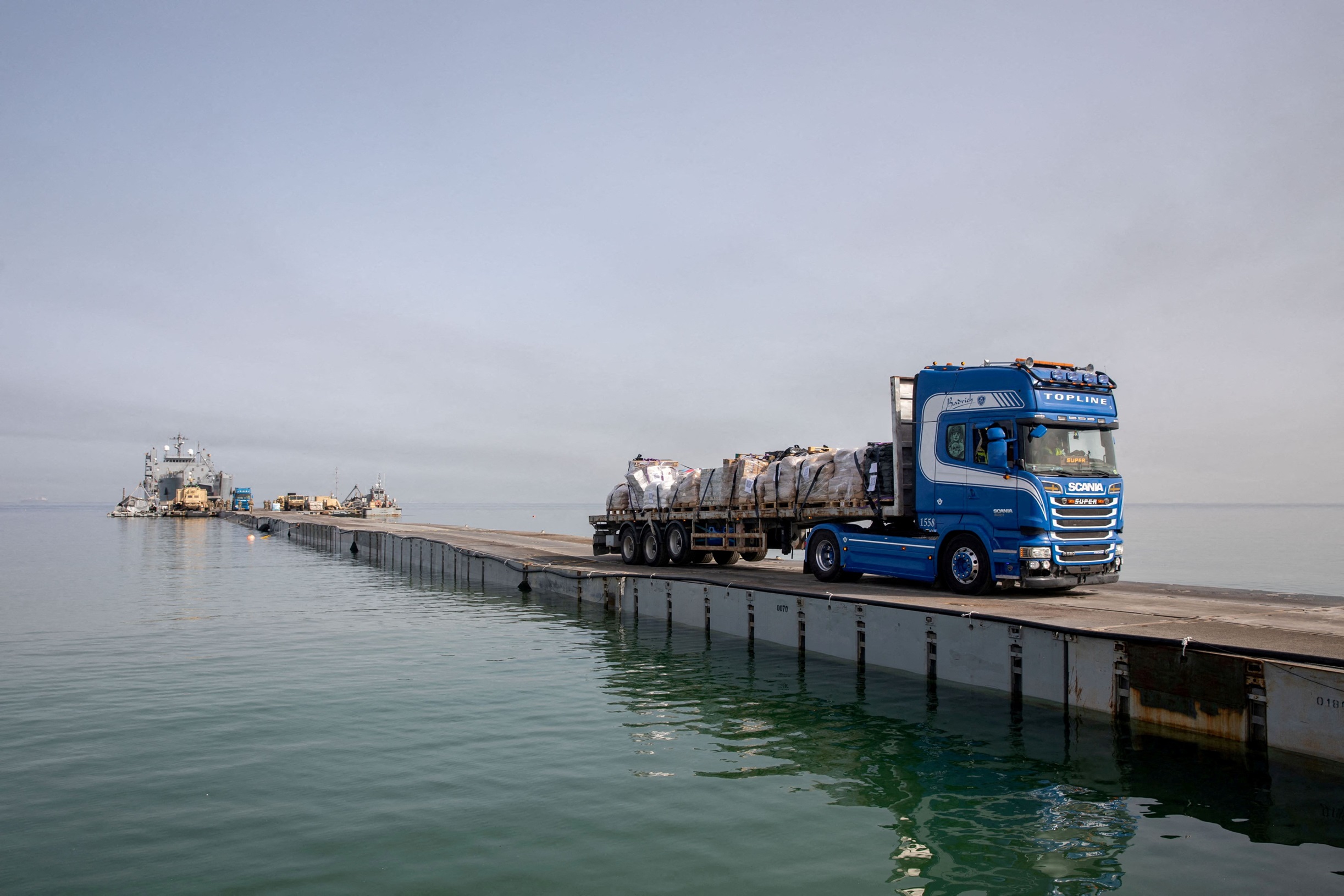The installation of a U.S.-constructed floating pier on Gaza’s beach has proven ineffective in addressing Gaza’s severe humanitarian crisis, local officials stated on 10 June.
“This pier is useless,” declared Salama Marouf, head of Gaza’s government media office, in an official statement. Marouf highlighted that since its inception in mid-May, the pier has facilitated the entry of humanitarian aid equivalent to 120 trucks. However, he criticized this effort as insufficient to meet the dire needs of Gaza’s population.
The Palestinian official attributed the ongoing humanitarian catastrophe to U.S. actions, calling on the international community to act swiftly to ensure the unobstructed delivery of humanitarian aid throughout the Gaza Strip.
The U.S. Central Command (CENTCOM) announced Saturday, 22 June, the resumption of aid deliveries via the temporary pier. This announcement followed a period of inactivity after the pier suffered damage in rough seas late last month.
A Costly Endeavor
A USD 320 million (EGP 15 billion) floating pier, constructed by the United States for aid delivery, has been attached to Gaza’s shore and began operations in mid-May, according to the United States Central Command (CENTCOM). However, aid groups have criticized the pier as an expensive and ineffective solution, highlighting that land routes remain the most efficient means of delivering humanitarian assistance to Gaza.
Originally conceived to supplement aid during Israel’s ongoing offensive in Gaza, the pier may now serve as one of a handful of entry points for aid following Israel’s closure of the Rafah land crossing with Egypt. Additionally, Israeli forces have started attacking aid trucks entering Gaza through Israeli checkpoints.
The Trident Pier, built using the U.S. military’s Joint Logistics Over the Shore (JLOTS) technology, consists of a floating offshore barge and a 550-meter causeway anchored to the shore. Aid is assembled and inspected in Cyprus with Israeli oversight to expedite the process upon arrival. After a 15-hour journey, the aid is unloaded onto the pier and transferred onto trucks driven by aid workers, who are then ferried to Gaza by smaller U.S. Army boats. At full capacity, the operation is expected to deliver 150 trucks daily, though international aid organizations estimate that at least 500 trucks are needed each day to avoid the unfolding famine situation in Gaza.
Significant Criticisms
The pier’s effectiveness is hampered by weather conditions; it is inoperable in waves exceeding 90 centimeters or winds over 24 kilometers per hour. Earlier this month, construction was paused due to high winds and sea swells, forcing a temporary relocation near Ashdod in Israel.
Recent aid distributions in Gaza have often ended in tragedy, with Israel’s military attacking aid convoys and facilities multiple times since October. Most recently, a foreign United Nations staff member was killed in eastern Rafah, and an attack on a World Central Kitchen convoy resulted in the deaths of seven aid workers.
The floating pier has faced significant criticism as a costly and complicated alternative to more straightforward solutions, such as reopening land crossings. The International Court of Justice has ordered Israel to open additional land routes, but these directives have only resulted in modest increases in aid flow, insufficient to meet the overwhelming need.
In his March State of the Union address, President Joe Biden highlighted the pier’s role in receiving large aid shipments, a move seen as an attempt to appease his Democratic Party’s base ahead of the November election. Schiffling observed that the pier, while showcasing U.S. military capabilities, ultimately falls short of addressing the fundamental need for reliable road access to Gaza.
Israel’s stringent blockade on Gaza has left its inhabitants on the brink of starvation, exacerbating the region’s humanitarian plight. The blockade has drawn widespread international condemnation, particularly in light of Israel’s sustained military operations in Gaza following the 7 October attack by the Palestinian group Hamas. Despite a United Nations Security Council (UNSC) resolution demanding an immediate ceasefire, the conflict continues unabated.
Since the onset of the Israeli offensive, more than 37,100 Palestinians have lost their lives, the majority being women and children, with nearly 84,700 others injured, according to local health officials.







Comment (1)
[…] post Gaza Pier Fails to Alleviate Humanitarian Crisis, Say Aid Workers first appeared on Egyptian […]